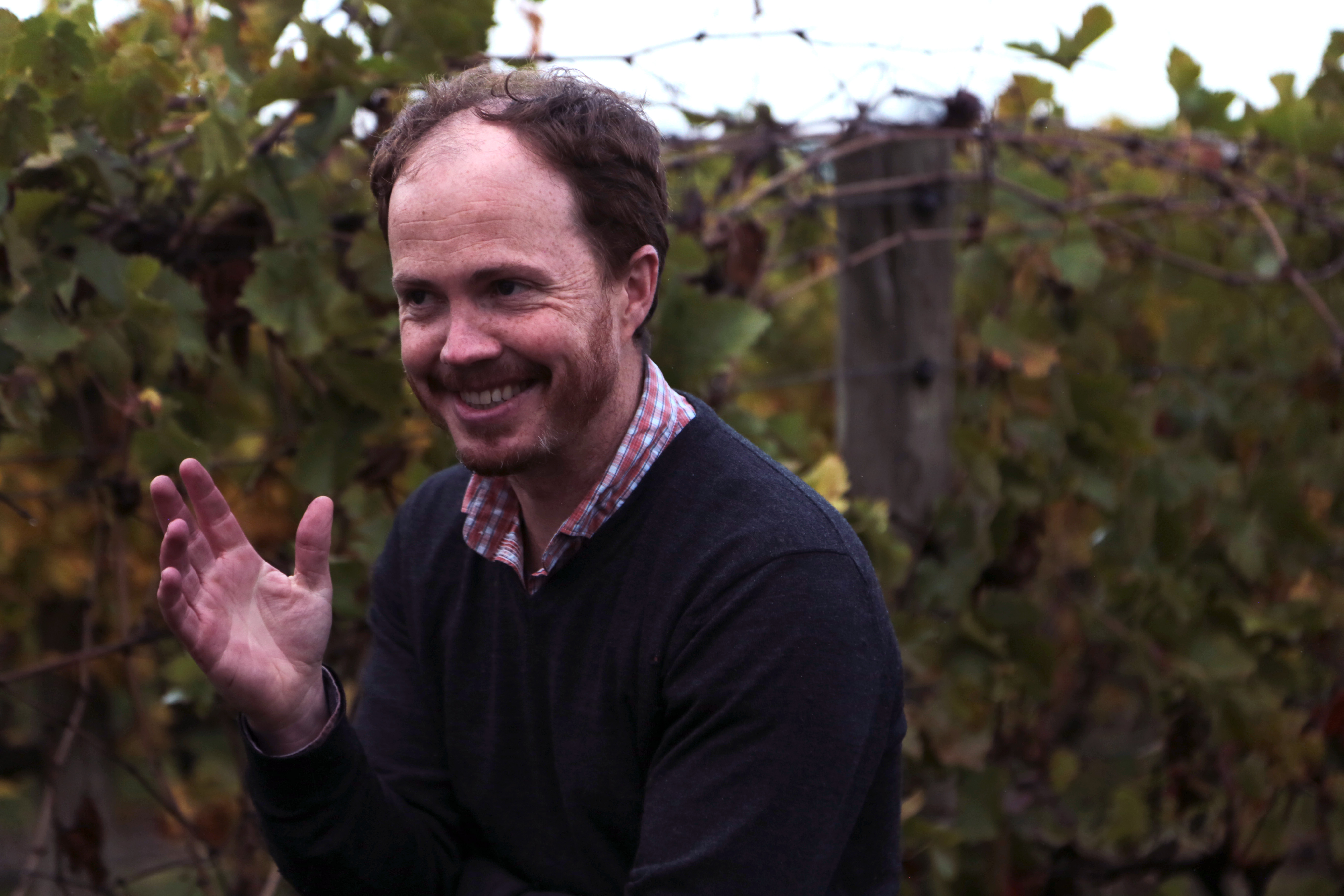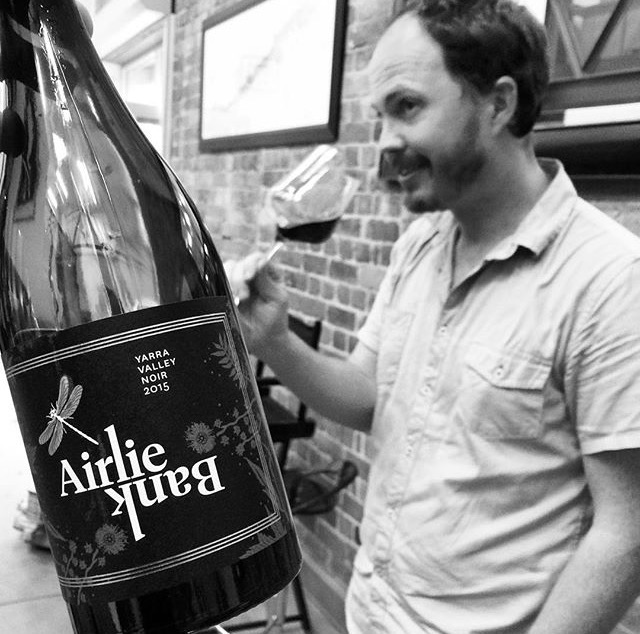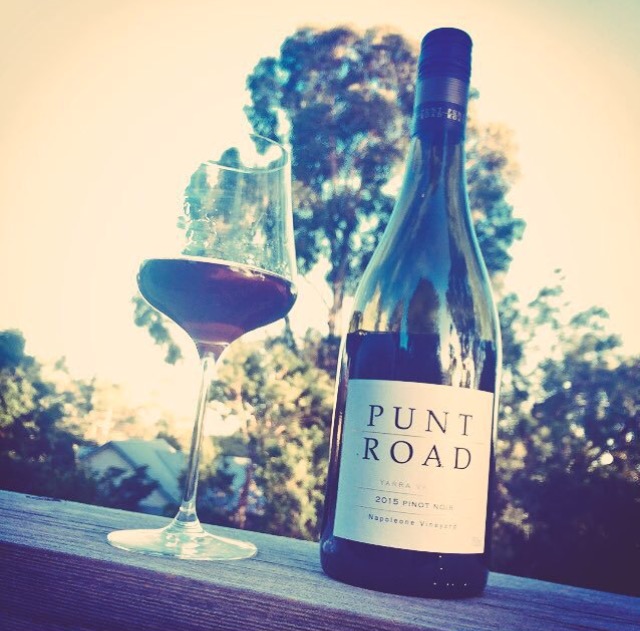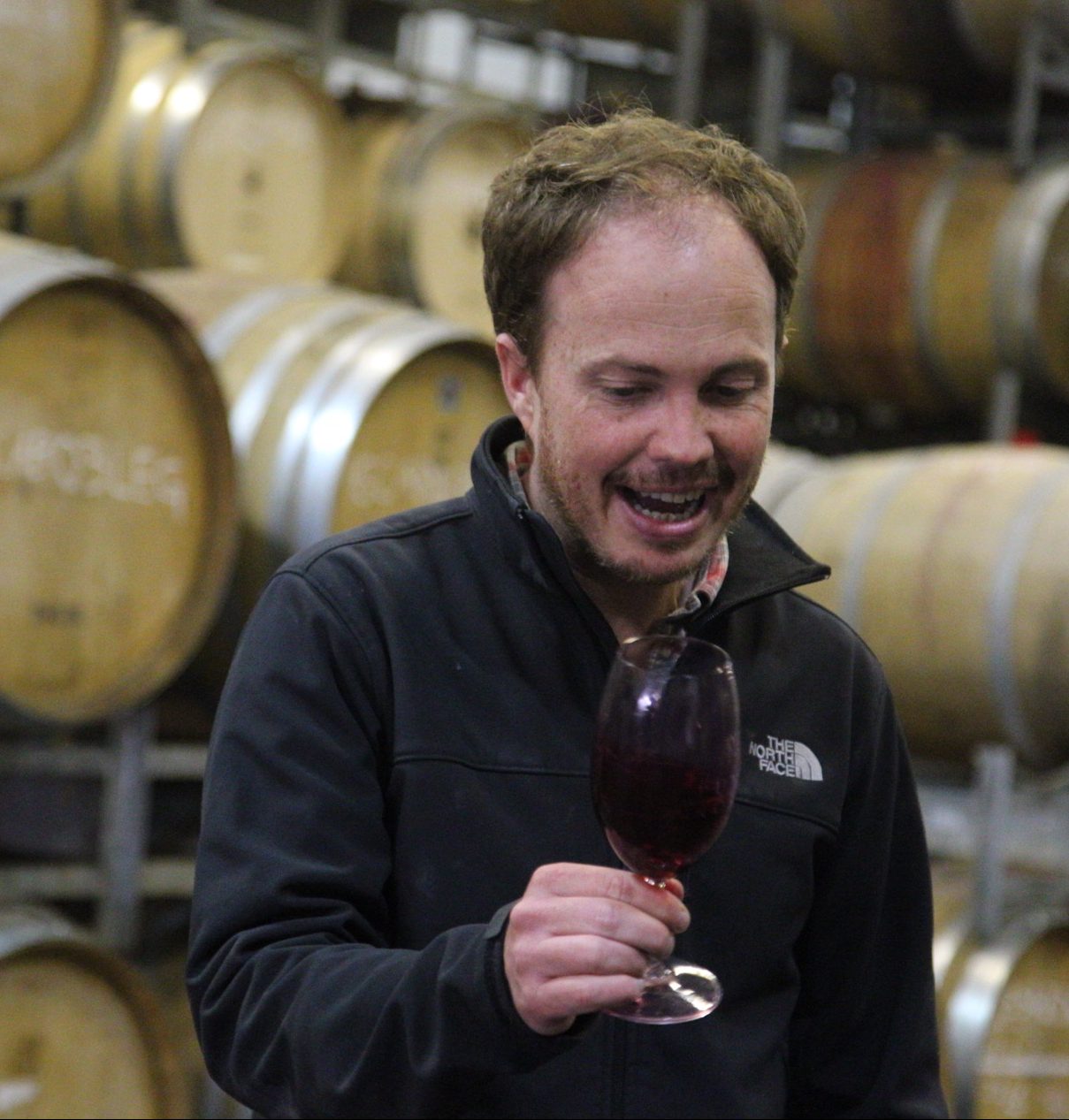By Ed Merrison
 Tim Shand has an alter ego. There’s Tim: Offspring of two teachers, incisive, earnest looking – even a touch of the nerds about him. Logistics whizz; lob a few moving parts at him and he won’t flinch – just knock up something tidy in no time.
Tim Shand has an alter ego. There’s Tim: Offspring of two teachers, incisive, earnest looking – even a touch of the nerds about him. Logistics whizz; lob a few moving parts at him and he won’t flinch – just knock up something tidy in no time.
And then there’s Shandy: Impish grin, sense of mischief, sub-surface surge of quiet confidence. Bit of a smart-arse; probably rubs a few people up the wrong way. Intuitive, impulsive, and with more flair than perhaps he realises.
Talk to him you and you sense the tension between Tim and Shandy, something akin to the counterbalance ‘twixt smooth fruit and acid cut, has always been there. Head winemaker at Punt Road in the Yarra Valley, Shand is palpably intelligent but hardly covered himself in glory in his formative years. Irked by academic parents peering over his shoulder, he squeaked through school and got into an arts degree in his hometown of Perth in Western Australia. Free to get up at midday and drift on down to the pub, he failed everything in the first year – and chucked it in.
Truth was, he didn’t know what he wanted to do, except travel. He had family in Zimbabwe and fulfilled a dream to travel the length of Africa, from Cairo to Cape Town. Towards the end of a great year, reality hit – “the anonymity of going through Heathrow, horrible hostels and having no money” – and he knew he was coming home to nothing. “What that taught me was that the world actually didn’t give two shits about me, and if I didn’t get my skates on, I was going to be in deep poo,” he says.
He had no connection to the vine – “bad wine, horrible beer and West Coast Coolers” had been the staples growing up – but knew he wasn’t cut out for academia or a desk job. It was 2000, a time of optimism in the WA wine scene, and he was vaguely aware of a dynamic industry down in Margaret River. He duly enrolled in a winemaking degree at Curtin University, chugging through the course but essentially grounded in his old Perth life, working part-time in a pub and drinking with his old mates.
 The change came when he got his hands dirty during his final year at Curtin. “I just went to the Halliday Wine Companion because I didn’t know shit, and looked up 5-star wineries – there weren’t as many then as there are now – and I just called them and asked to do vintage. The only one that got back to me was Leasingham in the Clare Valley.” He had a ball at Leasingham under Kerri Thompson (aka KT) and when he got back to WA, his campus had been moved to Margaret River. Finally he cut the Perth apron strings and became bound to wine.
The change came when he got his hands dirty during his final year at Curtin. “I just went to the Halliday Wine Companion because I didn’t know shit, and looked up 5-star wineries – there weren’t as many then as there are now – and I just called them and asked to do vintage. The only one that got back to me was Leasingham in the Clare Valley.” He had a ball at Leasingham under Kerri Thompson (aka KT) and when he got back to WA, his campus had been moved to Margaret River. Finally he cut the Perth apron strings and became bound to wine.
Shand went back to Hardys-owned Leasingham in 2004 as trainee winemaker and reckons boldness “way beyond my ability” accelerated his learning curve. This chutzpah, part ignorance and part derring-do, cut both ways. “I drove a forklift into their most expensive red ferment – a two-tonne ferment, pierced the tank and it all just pissed down the drain – because I was arrogant and I wasn’t being careful,” he recalls. On the flipside it’s what gave him the nerve to ask KT to sit in on her monthly tasting with the group winemaker, for whom dogsbody Shand had readied 100-odd Cabernet and Shiraz samples. “So I worked night shift, he arrived at 9am and I went into this tasting that was going to take six or seven hours. I must have looked like death warmed up. He kind of looked at me like, ‘What are you doing?’” But Shand managed to make a couple of pertinent comments, and the fact he’d skipped a sleep to be there left the boss impressed. That connection helped Shand secure a vintage in Hardys-affiliated Veramonte in Chile and, when he got back, a place at Hardys’ Yarra Valley sparkling specialist, Yarra Burn.
Sharply contrasting vintage experiences in the Haut-Médoc and the Côte de Nuits may reveal something about the Tim Shand dichotomy. He managed to “bore” the late Paul Pontallier into offering an incredibly rare opportunity at the first-growth Château Margaux. It was a disaster of grand cru classé proportions. Shand grudgingly admired the viticulture but was deeply unimpressed with everything else. “It was awful. I wasn’t allowed to do anything, they all hated me,” he says. “It was three months of torture. I used to call my wife in tears.”
He left feeling utterly rejected by France but gave it another shot with the Seysses family of Domaine Dujac. They took him in the following vintage, and it was a totally different story. “I went in ’08 to stay at the domaine with this lovely family,” he says. “I swear to God, I was there for two months and can almost remember every day and every experience. It was like some sort of blessing. I worry about going back to Burgundy because it was perfect in every way.” Those halcyon days in Morey-Saint-Denis were also instructive in winegrowing generally, and Pinot in particular. “It was an open palette. It was a conversation rather than a recipe at Dujac. It was so interesting, so terroir-driven, so transparent.”
 Like France, Shand’s time at Giant Steps in the Yarra Valley proved intensely bittersweet. On the plus side, he learned precisely what it took to make top-notch Australian Chardonnay, Pinot Noir, Shiraz and Cabernet. He’s also unstinting in his admiration for the “creativity and innovation” of 2016 Gourmet Traveller WINE Winemaker of the Year Steve Flamsteed. “What it is, is having the courage to put yourself out there and back your talent.” says Shand. “It’s his gut. It’s an understanding of aesthetics matched with high energy and intensity, is where his success lies.”
Like France, Shand’s time at Giant Steps in the Yarra Valley proved intensely bittersweet. On the plus side, he learned precisely what it took to make top-notch Australian Chardonnay, Pinot Noir, Shiraz and Cabernet. He’s also unstinting in his admiration for the “creativity and innovation” of 2016 Gourmet Traveller WINE Winemaker of the Year Steve Flamsteed. “What it is, is having the courage to put yourself out there and back your talent.” says Shand. “It’s his gut. It’s an understanding of aesthetics matched with high energy and intensity, is where his success lies.”
Ask Shand about his own strengths, and he’s typically candid. He reckons he lacks originality and doesn’t see artistry in what he does. “To me, winemaking is not an art. I think it’s a trade. It’s arguably more like being a jeweller or a carpenter. I think if you’re telling people you’re an artist, you’re a bullshit artist.”
Instead, he feels he’s good at the boring stuff and owes his success to his work ethic and high standards. “In terms of wine and vineyard and people, I know what good looks like and I know what bad looks like. I kind of understand the standard and I know how to meet it,” he says. “There’s the right day to pick the grapes, there’s the right way to make it, the right oak, the right bottling date. That’s kind of par; anything below that, you’ve f***ed it up.”
I put it to him that the tradie analogy doesn’t really hold up. I assume, perhaps naively, that there’s less vintage variation in planks than Pinot Noir. The last few harvests in the Yarra have yielded many exceptional wines but could hardly be described as uniform. Many reported being turned inside out by fast and furious, topsy-turvy 2016. Shand, on the other hand, was in his element. “One of my skills is, having all of those factors in my head, I can balance them out to the right outcome. Calculations, priorities – that’s what I think I’m good at: bringing a lot of things together,” he confesses. “And wine is a lot of things. It’s agriculture, it’s marketing, it’s sales, it’s logistics, it’s science. You bring them all together. That’s what I think I like about it, and I just can’t fathom people who don’t bring things together.”
Evidently Shand’s developed a knack for bringing things together nicely. He’s widely credited with winning Punt Road promotion to the Yarra Valley’s premier league, a feat illustrated by its silverware haul at last year’s Royal Melbourne Wine Awards: best single-vineyard wine, best Shiraz and trophy for viticultural excellence. Gary Walsh of independent review site The Wine Front says Tim is “turning out some of the best value, and most interesting, wines in the country” under the Punt Road and Airlie Bank labels. Tim puts it down to having everything in the right place, in moderation. “All of the interest with none of the nonsense, at a good price,” he says, citing his highly original and widely loved Airlie Bank Franc as a case in point. Made with 100% whole bunch carbonic maceration, it’s hardly the most conventional crowd-pleaser.
 If that’s the Shand standard, what makes for greatness? “A wine not made to instantly ingratiate itself,” he muses. “When I taste a Wendouree, or a grand cru next to a 1er cru, I taste profundity. I taste a confidence. It knows what it is. There’s a comfort in its own skin. That’s what a lot of people don’t understand about wine: that less is more. My place in it all is to keep doing the boring stuff, and authenticity will shine through.”
If that’s the Shand standard, what makes for greatness? “A wine not made to instantly ingratiate itself,” he muses. “When I taste a Wendouree, or a grand cru next to a 1er cru, I taste profundity. I taste a confidence. It knows what it is. There’s a comfort in its own skin. That’s what a lot of people don’t understand about wine: that less is more. My place in it all is to keep doing the boring stuff, and authenticity will shine through.”
Straight-talking and clear-sighted he may be, but perhaps Shand overlooks the role played by his inner rogue. The youthful rebellion, the pierced tank, the misadventure in Margaux – all these point to a non-conformist side that lends tension to Shand’s universe.
Some are apt to use the terms tension and balance interchangeably in tasting notes, but to me they’re not the same. The latter hints at a pleasing harmony, and is a wonderful thing. The former, running closer to the edge, is more daring, more intriguing. And you sense that the two sides of the imperfectly balanced Tim Shand give you the latter.
Dr Tim ensures order and completeness, and the mercurial Mr Shand takes it a little further, deeper. It’s compelling viewing and can lead to profundity – with the emphasis on “fun”.